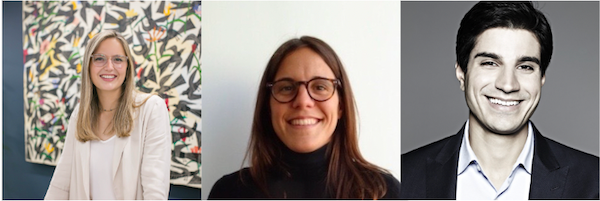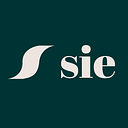
Fundraising is one of the biggest challenges for every founder. The longer the fundraising cycle, the less time founders spend on core business activities. Raising from Venture Capitalists is not the most straightforward journey. At Sie, we designed our Catalyst Program to drive more cheques to female founders, make the fundraising process less painful and unlock access to Venture Capital. Most importantly, we want to bring more transparency to the whole process, for founders to make the best decisions for their companies early on. A very important part of our program is to pair VCs and founders who then work together over the course of the three-months.
As our third Catalyst Program comes to an end, we asked Cynthia Aliaga — co-founder of Givver — and our Venture Community members Kanishk Walia (MiddleGame Ventures) & Daniela Raffel (Dawn Capital) about their experience and what advice they would give to founders.
To kick-off, can you each introduce yourselves?
[Cynthia] I’m Cynthia — co-founder of Givver. We help European SMEs remove the friction from onboarding, managing and paying employees. Givver is a powerful people management platform built for simplicity and collaboration with automation at its core. Previously I was Talent Acquisition lead at Checkout.com, Revolut, Curve and Tymit.
[Daniela] I’m Daniela and work for Dawn Capital. We are a Series A/B VC fund based in London and investing in European founders with global ambitions. We focus only on B2B SaaS and Fintech and I spend most of my time looking at Fintech and Enterprise Automation within that. From an angel investing perspective I have backed 100% female founders!
[Kanishk] I’m Kanishk from MiddleGame Ventures. We’re a FinTech and Digital Asset focused venture capital fund investing in European pre-seed to Series B start-ups that are re-architecting the future of financial services across banking, insurance, payments, capital markets, asset management and adjacent areas.
Cynthia ~ What did you expect from Sie before joining the program?
[Cynthia] We expected Sie’s network of experts to provide some expertise but nothing could have prepared us for how valuable the advice they offered during those weekly sessions, 1:1s and tapping into their network would be.
We planned to raise our first VC round after bootstrapping for almost a year. The Sie team have been a constant support throughout the entire program. What’s been most important for us is that they have helped us to be confident in what we are doing while providing valuable insights into how things should work for both founders and investors.
Daniela & Kanishk ~ Why did you say yes to mentoring via the Sie Catalyst program?
[Kanishk] It is now a well-known and publicised fact (per the British Business Bank) that for every £1 invested in VC in the UK, c.89p goes towards all male founding teams, 10p towards mixed gender founding teams and 1p towards all female founding teams. We view mentoring and supporting female founders at the earliest stages of company building as critical to increasing VC investment in female founding teams and the Sie Catalyst program as core to this effort.
[Daniela] Because that’s the only answer I could possibly give! The Catalyst program is one of the best run that I’ve been a part of. They make a genuine effort to partner you with startups that can benefit from your area of expertise so that a) you feel like you are really able to make a difference and b) the startups can actually benefit from the set up. The founders also come ready to act and are there to get the most out of every interaction so it’s really rewarding for everyone involved.
And, tell us about your experiences mentoring Cynthia & Elena. Any highlights or learnings you’d like to share?
[Daniela] Cynthia and Elena came with a clear goal in mind — to refine their pitch and pitch deck. I think that focus really helped make it the fun and productive experience that it was on both sides because on the one hand, Cynthia and Elena have achieved a tangible goal, and on the other hand I also feel like my time has been super well used. So I would say that the learning is to come with something tangible you want to get out of the program.
[Kanishk] Both Cynthia and Elena bring tremendous energy and passion for the product they are building and have been a pleasure to work with. They are highly knowledgeable about the market they are operating in while acknowledging the areas they are less familiar with being first time founders. It has been great to see them absorb feedback and iterate quickly on their product, vision and fundraising materials.
What have you learnt, along the way, in terms of how investors can better support (female) founders?
[Kanishk] Investors need to continue focusing on both the strength and diversity of their pipeline as well as identifying obstacles (with respect to access and support) preventing certain segments of that pipeline from advancing up the origination funnel.
[Daniela] I think it really depends on the founder. Good support is going to look different if you’re a first or second time founder, if you’ve had exposure to VC before or not and a whole range of other factors. So without over generalising, I think a very simple but effective way to support founders is to make sure that they know ‘how to play’ the VC game. Even for founders who have had experience with VC before, what VCs are looking for can change, especially when market conditions change, and I think that helping founders think about how their startup is best positioned in any given environment and VC context can be very helpful.
Great to hear, and Cynthia, tell us about your experience. You were supported by two VCs at Sie Catalyst — different investors offer different perspectives. With Kanishk and Daniela, what were the different perspectives & benefits?
[Cynthia] Kanishk’s knowledge in the payroll and fintech industry gave us valuable insights into how we could approach our customer acquisition and possible synergies with other businesses. Daniela, on the other hand, helped us hone our pitch, tell our story and highlight our unique value proposition effectively. Having someone with experience in the VC industry can help you avoid mistakes and implement best practices while also providing valuable insights into what investors are looking for in a startup.
And outside of the mentoring?
[Cynthia] I met several incredibly ambitious female founders and learned from their experiences. The opportunity for feedback sessions with VCs and Angels was invaluable. The Showcase day was very beneficial because it gave us an opportunity to pitch in front of more than 100 VCs and Angels — something not many people do in other programs or accelerators. Above all, the most important aspect was getting advice from people who have done it before, so you know where you’re heading and what to expect.
And what has been the biggest learning or behaviour adjustment you’ve made with regards to VCs and your fundraise? How has it changed your understanding of how VCs think and operate?
[Cynthia] My understanding of how venture capitalists think and operate has drastically changed. I now have a better understanding of the criteria VCs use to evaluate potential investments and the risks and rewards associated with different stages of investment. I also understand the importance of developing relationships with VCs and the need to understand their specific investment strategies. It is essential to be realistic about your expectations. Being aware of the current market trends and having a clear go-to-market strategy is critical to successfully pitching to VCs, as well as creating a compelling story to show them how Givver can be the next Unicorn in the HRtech space.
What advice would you give to other founders to gain the most from interactions with VCs — either pitching or having a VC as your biggest ambassador?
- Do your research before approaching them, and understand their investment strategy, focus areas and portfolio companies. Ensure you’re well prepared with an investor-friendly pitch deck that clearly articulates your long-term vision, strategy value proposition and go-to-market plan.
- Build relationships and reach out to VCs before you’re planning to raise. Connect with them on social media, attend events they’re speaking at and look for mutual connections that could make an intro.
- Ensure you understand the jargon and terminology VCs use. Know the key metrics used to evaluate a business and be prepared for the inevitable questions on them.
- Always sell your long-term vision. VCs are looking for businesses with potential growth and high returns. Show VCs that you have the vision and confidence to take your business to the next level.
- Follow up with the VCs after your pitch to keep the conversation going, demonstrate your commitment and always ask for feedback. You won’t always change your business plan based on their feedback but keep an open mind and listen to what they tell you.
Dawn & Kanishk, with this in mind, what do you think are the two most important things to get right before founders start their fundraising process and discussions with VCs?
[Kanishk] From an operational perspective, at the pre-seed/ seed stage, it is important for founders to demonstrate founder-market fit and outline a clear strategy to test out their hypothesis and assumptions to get to product-market fit. They should be able to convey to investors why they are the right team (for example, with respect to domain knowledge or technical acumen) to build the proposed product and what unique insights they may have on the market they are targeting. At the Series A/ Series B stage, it is important for founders to highlight early evidence of product-market fit and demonstrate that there is a strong and large market need for the product they have built. Founders should also be able to convince investors that they are on the path to building a repeatable sales process and finding product-market-sales channel fit.
[Daniela] You should know what you’re fundraising for. It sounds simple but once this is clear then the first question is whether VC funding is the right option, do you actually need non-dilutive working capital or perhaps M&A financing — VC funding isn’t always the right answer. If you do decide on VC funding, that same question will help you answer how much you need and who from. Knowing what you are raising for means that you can budget it into your plan and avoid the twin perils of raising too much or too little to achieve those aims and hit the next funding round with momentum. Who you need supporting you to achieve that is another question — are you looking for specific support or specialism from a fund or just looking to add fuel to the fire with cash. So this one simple question can help you refine a lot of things in your fundraise.
Thank you to Cynthia, Kanishk & Daniela for sharing their incredibly helpful insights.
Our next programme applications will open in May 2023. If you’re a female (co-) founded early stage technology business, we’d love to hear from you! Feel free to keep up to date with everything Sie via our newsletter including program announcements.
Wishing you a brilliant Christmas & New Year. See you in 2023.
